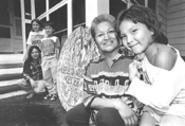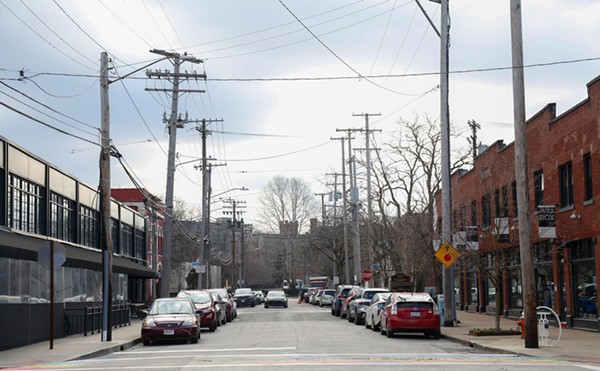Through that heritage, he is finding the means to stay sober.
Michael is part of a program, new to Cleveland, that incorporates Native American rituals into the treatment of alcohol and drug dependency. The Red Spirit Circle offers pipe ceremonies and sweat lodges, along with talk therapy. In addition to a local facilitator, elders and holy men from around the United States come to Northeast Ohio to perform sacred ceremonies.
About 4,000 Native Americans, representing 44 Indian nations, live in the Cleveland area. Until recently, those with substance abuse problems have not had a program specifically geared to their cultural and religious needs.
"It's rare for a Native American to come into AA treatment, and if they come, they don't stay," says Lois Stands, program coordinator for the Red Spirit Circle. "AA counselors don't have the cultural awareness, so they can't reach or keep a Native American in treatment long enough."
A Lakota Indian, Stands went through a similar treatment program 16 years ago.
The Red Spirit Circle was started in June by the nonprofit American Indian Education Center, with funding from the Ridgecliff Foundation. Weekly gatherings are held at the center's new location at the Broadway United Methodist Church in Cleveland.
The program stresses the five values for living a good life and regaining footing on the Red Road, or spiritual path, as passed down from tribe elders: generosity and sharing, respect for older people, getting along with nature, individual freedom, and courage.
"We're trying to touch the person more at the core values that were given to them when they were growing up, that they no longer had a way to address in their lives," says Herb Stevenson, a member of the center's board.
Stevenson handcrafted a "talking stick," which is passed around by participants in talking circle ceremonies. A sizable quartz crystal at the tip of the hickory stick symbolizes the bringing of light into the speaker's life. Dangling from a leather binding, two hawk feathers represent the need for each participant to have clear vision and to focus his or her concentration on healing.
"Those in the circle must honor and respect the person holding the stick, by being not only silent in their words, but silent in their minds," explains Stevenson, who has made 30 talking sticks. "That way, they can be fully present and accept that person's experience."
Red Spirit Circles have proved successful elsewhere, most notably at the Selkirk Health Centre in Manitoba, Canada, and at a Veterans Administration facility in Prescott, Arizona.
According to Robert Roche, the Cleveland center's executive director, this community has not had a comparable, spirit-based treatment program since the early '70s, when activist/actor Russell Means and other Native Americans launched one here.
"There's been a definite need for this in our community," Roche says. "I'm hoping we can eventually have a residential treatment center. But at this point, we can reach people on a one-to-one basis, with Lois going into the homes."
Stands's outreach includes bars that are known to be favorite haunts of local Native Americans and the street, where she found Michael. After she spoke to him, he hugged her and cried, telling her how alone he felt.
"You feel lost and all alone when you come to the city, because you don't have any traditional ceremonies or guidance, since all of our elders are back on the reservations," says Stands, who came here from Pine Ridge, South Dakota. "That's why I know this program will work here in the city."














